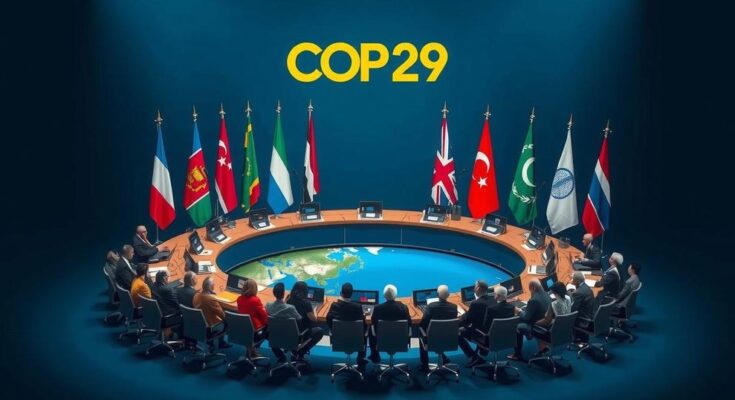COP29 in Baku highlights the urgent need for wealthy nations to commit trillions for climate finance, replacing the inadequate $100 billion annual pledge. With rising temperatures threatening public health and extensive climate disasters, developing countries demand serious commitments. Key negotiations are complicated by differing opinions on financial responsibility, yet the dialogue persists amidst pressing global climate realities.
As COP29 commenced in Baku, Azerbaijan, over 40,000 delegates gathered to navigate the complexities of climate financing amidst escalating demands from developing nations for substantial financial commitments from wealthier countries. The primary objective centers on establishing a new global climate finance target by 2025, intended to supersede the inadequate $100 billion annual pledge made in 2009. Despite calls for immediate action, there remain persistent disagreements regarding the distribution of financial responsibilities and requirements amidst the backdrop of an alarming climate reality, which includes rising global temperatures and increasing instances of extreme climate events. During the opening remarks, COP29 president Mukhtar Babayev stressed the urgency of addressing climate change, stating, “We are on the road to ruin,” echoing sentiments that current policies are insufficient for meeting climate targets. Health experts further advocated for the integration of health considerations in climate frameworks, emphasizing the critical need for sound climate funding to mitigate public health risks driven by climate change. While the ongoing discourse remains fraught with challenges, including inconsistent national commitments and complex negotiations on finance and emissions, pivotal statements from international leaders highlight the necessity of collaboration and decisive action to avert imminent climatic catastrophes. As nations struggle to align their positions, the outcome of COP29 may shape global strategies for addressing climate impacts well into the future.
The conference, COP29, represents a significant moment in global climate negotiations, following the recent failures of the biodiversity summit. The pressing need to agree upon a new financing framework is underscored by the increasing scale of climate disasters that demand a coordinated and immediate response. Yet, developing nations insist that affluent countries fortify their commitments to climate finance, reframing the narrative of climate initiatives from charitable acts to essential responsibilities. The critical dialogue at COP29 hinges upon reconciling these differing perspectives on funding and accountability, exacerbated by an often fragmented international approach to climate action.
In summary, COP29 serves as a crucial juncture for global climate negotiations, emphasizing the pressing need for coordinated and substantial financial commitments from developed nations toward combating climate change. Despite ongoing disagreements, the pressing nature of climate-related health impacts and the rising temperatures necessitate urgent action. The effectiveness of this conference may set a precedent for future climate frameworks and could determine the trajectory of international responses to the climate crisis, emphasizing that collaboration and ambition are essential components for success.
Original Source: healthpolicy-watch.news




